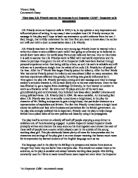Because the inspector seems to know everything, the characters are driven to make their confessions by being cleverly led on by the inspector. As the involvement of each member of the family is established, the play becomes a 'whodunit' with the Inspector gradually unravelling the history of Eva Smith.
The stage directions in act one show the importance of the Inspector, he "creates at once an impression of massiveness." He also interrupts on a few occasions by "cutting through, massively." This shows he has power and can talk whenever he wants. He also has a "habit of looking hard at the person he addresses before actually speaking." He often makes the characters in the play feel uncomfortable and makes himself seem more important by making them answer him. The inspector is in control throughout the play, despite Mr Birling’s attempts to undermine and threaten him by telling the inspector he knows his superiors. The inspector is a powerful and all-knowing man, no one tells him anything he does not already know.
As well al conveying Priestly’s views, the inspector is in the play to make the characters realise where they are going wrong in life, this is shown when Sheila accepts the blame of Eva Smith's death all on her own accord, the inspector assures her and asks her to stay and listen to Gerald's part in Eva’s death, so she doesn't blame herself entirely.
In the inspector’s final speech he is basically saying that unless they make an effort to help out people of the lower class they will be punished, “If men will not learn that lesson, they will be taught in fire and blood and anguish.”
Mr and Mrs Birling are Priestly’s examples of a typical upper-class snob; all they care about is their reputation and money. When they find out that it was all a hoax they would have been happy to go on blanking out all bad aspects of life that don’t concern them. Mr Birling is a self-loving recognisable capitalist who believes that whatever he says is unquestionably true. Mrs Birling is a perfect match for her husband, she shows no consideration for others and doesn’t work at the charity council because she wants to help the poor but because she wants to feel more superior to the lower class. Priestley shows how both of these parents refuse to accept any responsibility for Eva’s death and refuse to change their immoral and shameful ways.
Sheila and Eric are Priestley’s ‘trophies’. They have both been sinners but the Inspector helps them to realise their mistakes. They accept full responsibility for their old actions and show they've learnt from them. They also know that they cannot brush this under the carpet. "I know I'm to blame and I'm desperately sorry,” "The fact remains that I did whatever I did," Sheila has learnt that although there was no Eva Smith their actions could easily have lead to the death of someone. Sheila and Eric have greatly changed from the beginning of the evening from being capitalists to socialists. "Everything we said had happened really had happened. If it didn't end tragically, then that's lucky for us. But it might have done". Priestly one main objective was to influence the public and make sure the audience left his play changed people. He is saying that it is up to the younger generation to change for the better because older people are a lot more resisted and attached more to their ideas and beliefs.
I think the play has two main themes, first it points to the need for each human being to accept their responsibility to look after those less privileged than themselves. Second is that younger people are more conscious of their behaviour and are less selfish than the older generations.







